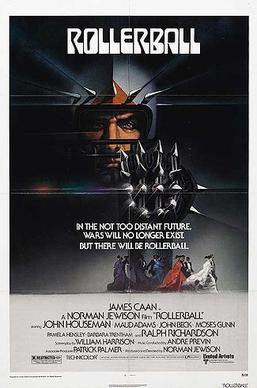 |
| Everyone will cheer me on |
For one thing, this entire film works as a behind-the-scenes look at a sport's greatest athlete. James Caan is actually playing Gretzky, Ali, Ruth - any physical masterpiece who gets public recognition in their heyday. As such, you can actually watch the movie as one long "back-stage" vid into a few weeks of JE's life. Better still, its appeal is rooted in being so similar to the classic Spartacus.
It also helps that the scenes are effective in selling a future world. The locations are all dressed so that you buy into the settings and people. Arenas will probably always look the same, as will their raving fans; swank homes, studios, and libraries are sold smoothly. Conviction and hard work keep this movie going.
Of course, Rollerball works too because of neat themes, a compelling lead, and well-shot action. James Caan as Jonathan is credible as a slightly-complex man who loves to brawl, and uses his mind to brawl better. He manages to be both spoiled and thoughtful, gracious and tough, selfless and elite and common. He's not only an example of society's best, Mr. E. is a person you can't envy or begrudge.
The story has an A Clockwork Orange element which drives the picture and its story: a futuristic gladiator discovers that his game is a sham. Corporations run every government in 2018, and they're in cahoots, using his sport (Rollerball) to distract oppressed citizens. E is so good that he's threatening to become too popular to the public, so the govt's absolutely insist that he retire. Instead, he fights.
It's this basic struggle for freedom - and to do the right thing - that makes Rollerball such a relatable picture. Instead of exploiting his social position too badly, or selling his ideals out, he tests the waters and tries to figure out (a) what's going on and (b) what's his best move. Most everybody loves an underdog, but we all pull for someone who fights the good fight.
You wanna know what's a little hard to notice in this movie? It sticks to its intended format really well. A perfect example is the last 10 seconds, the cutting, where and when the frame freezes, and the music over the credits. The very end of the picture reminds you that you can take all tihis as a documentary, which isn't always what Rollerball feels like.
Best of all, E.'s personality makes it easy to enjoy all the bloodshed. The cast here beats each other bloody, and they're the sorts of folks who are both good at and enjoy it. The damage they inflict regularly is severe, but they're never offensive or repulsive. It's hard to think that you're actually cheering on a man who beats people to death, especially when he's not a prisoner. Yet this non-slave fights for professional (and social) freedom, and Caan's lead just pulls you in.
How did a film get me to support a man who punches athletes with a pair of spiked gloves? I guess the fact that it seems like a genuine science-fiction movie. Star Wars uses future technology to tell a story that's basically Conan the Barbarian; Blade Runner is about distinguishing "humanity" and "a soul" when people can basically be manufactured. Real sci-fi uses its adventures to sell its ideas, but sci-fantasy uses everything to sell the adventure.
And, like in A Clockwork Orange, the protagonist's enemy is just so overwhelming! The corporate governments want to censor everyone and control what they read. "Corporate hymns" are played before each match. An Executive actually requested "possession" of Jonathan E's wife - and that's perfectly natural and proper! John Houseman's "Mr. Bartholemew" baldly tells him that Rollerball "was created to demonstrate the futility of individual effort."
These last elements are pretty impressive, because they show corporations enforcing socialism on the entire world. The entire social structure plays out like Animal Farm - the pigs are the executives, doing the least work and abusing their power relentlessly. Individuals are taught to think only of the collective, and are denied basic rights and freedoms. Underlying all the rhetoric and manipulation, you see that it's all a lie...
I wrote above that Rollerball seems like some future-sport Michael Jordan documentary, and I should've said that it seems like an artsy one. There's a scene that sells the social problems in a neat way: Jonathan attends a swank high society party. The other elite guests get high, find a laser gun, and shoot a stand of trees. They drunkenly create a mini-inferno of nature in their host's backyard, and they all love every second of it; everyone's an out-of-control child, which keeps them controlled.
While the cream of society's crop is lost up their own backsides, the rest of it is tangled up in their love of Rollerball. The whole social order has basically checked out (like in Logan's Run), and only library clerks notice that actual books are being tossed and replaced by digital copies "edited and approved" by the government.
This picture proves to be such a savior story that it's nearly worth calling it "biblical." The smart sensibilities that set it apart - a spoiled and yet grateful public hero, a domineering government, manipulation of the masses - make it a fictional sports biopic that's smart and thoughtful, while being blood-pumpingly brutal and fun and bloody.

No comments:
Post a Comment
Chime in!